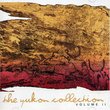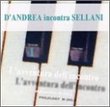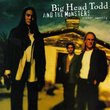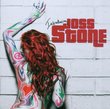| All Artists: Giacomo Puccini, Heinrich Proch, Giuseppe Verdi, Gaetano Donizetti, Leo Delibes, Wolfgang Amadeus Mozart, Giacomo Meyerbeer, Gustave Charpentier, Gioachino Rossini, Ambroise Thomas, Richard [Classical] Wagner, Gaspare Spontini, Vincenzo Bellini, Oliviero de Fabritiis, Alfredo Simonetto, Antonino Votto, Nicola Rescigno, Turin RAI Orchestra, Rome RAI Orchestra, Milan RAI Symphony Orchestra Title: Maria Callas: Live In Concert Members Wishing: 0 Total Copies: 0 Label: EMI Classics Original Release Date: 1/1/1953 Re-Release Date: 1/20/1998 Album Type: Live Genres: Pop, Classical Styles: Vocal Pop, Opera & Classical Vocal, Historical Periods, Classical (c.1770-1830), Modern, 20th, & 21st Century Number of Discs: 2 SwapaCD Credits: 2 UPC: 724357203029 |
Search - Giacomo Puccini, Heinrich Proch, Giuseppe Verdi :: Maria Callas: Live In Concert
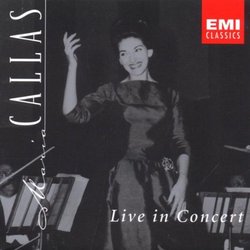 | Giacomo Puccini, Heinrich Proch, Giuseppe Verdi Maria Callas: Live In Concert Genres: Pop, Classical
|
Larger Image |
CD DetailsSimilar CDs
Similarly Requested CDs
|
CD ReviewsLa Divina always will be La Divina!!!!!!!!! José Manuel Vizcaya | México, D.F. Mexico | 03/26/2002 (5 out of 5 stars) "This CD contains the very best moments of the Greek Diva!!!! It begins with the aria "Un bel dí", from Madama Butterfly, sung in 1935 under the name of "Nina Foresti". Although Callas always denied have sung under this pseudonym, and despite the voice in the aria is very different from the voice we know of Callas (she was only 12 at this moment), the voice we hear at the beginning of the interview is infallible. The CD continues with extracts of the RAI Recitals she gave for the Italian Radio. The first was is in Turin (1951), whose "Aria and Variations for flute, soprano and orchestra, Deh! Torna mio Bene" by Proch, is the most vivid example of her virtuosity, despite the sound. The next recital was in Rome (1952), where she sang without equal the "Bell song" from Lakmé, the "Mad Scene" from Lucia (both ending with a high E), the aria from Nabucco and her incomparable Lady Macbeth!!! If this is not enough, we have the next RAI Recital in San Remo (1954): her first aproach to the french language is heard in "Depuis le jour", a jewel in "Tutte le torture", the wonderful "D'amore al dolce impero" and the echoes in the shadow song "Ombra leggiera" (ending with a top D). Finally, is included only one aria from the recital of Milan (1956): the Mad Scene from Hamlet (sung in italian) is very enjoyable!!!!! (Unfortunately, they not included the Semiramide's aria "Bel Raggio Lusinghier" from the same concert) What technique and what coloratura is shown in this recitals!!!!!!Immediatly, Callas goes deeper with the Isolda's death "Dolce e calmo" (one of the two versions of this wagnerian aria), sung in Athenas (1957). Finally, the compilation ends with the concert of Amsterdam (1959), considered by the critics like the peak of her career. The arias included here are from la Vestale, Don Carlo, Ernani and Il Pirata.This CD is a compilation that shows what Maria Callas was capable at her most inspired!!!!!!!" Stupendous! Gapare Pacchierrotti | Canada | 12/21/1999 (5 out of 5 stars) "I am a Callas fan, and it would be dishonest to try to present the idea I am neutral regarding her. However, this said, I have always been rather objective when discussing her. For those who are not familiar with the Callas sound, be prepared, it is like no other. It is often shrill, even hard pressed, at times she has an uncontrolled wobble when singing high notes, she sounds like she is singing into a bottle in the middle voice, and growlying on low notes. Doesn't sound too pretty, does it? Well, in the classic vocal sense it isn't. It is what she does with what she was given that is so remarkable. Yes, one would and does expect totally musical loveliness from Sutherland, but with Callas one seldom hear that. One does hear a wondrous technique, a glorious spinning of a vocal line, emotions that are to the depths of the human heart, words -- yes, one HEARS the words -- that are ripe with meaning. Her legato is seamless, and her use of glossandos when decending in a passage take the breath away. The miracle is one actually thinks they are hearing extremely lovely singing, with lovely gentle tones that caress the ears. Callas is well supported by the various orchestras, and has sympathetic conductors who seem to understand her very riviting readings of the music. You will hear Callas, as she is, and the miracle that was her." WHY WERE SOME OF THESE ITEMS RELEASED IN THE FIRST PLACE? L. Mitnick | Chicago, Illinois United States | 08/16/2006 (2 out of 5 stars) "Plain and simply, Maria Callas was the operatic icon of the Twentieth Century. The vocal, musical, and dramatic coponents of her art totaled a "complete package" that no one, living or historical, could come within miles of. My gripe here is with EMI, who, while they recorded Callas extensively in the standard repertoire (I am not including the studio recitals here), they completely missed the boat by not recording the great diva in roles like Lady Macbeth, Anna Bolena, Imogene in "Pirata", Elena in "Vespri", Abigalle in "Nabucco", and a few others. They have tried in recent years to correct this error by issuing live performances (with barely adequate sound) of "Bolena", "Macbeth", and "Pirata", etc. But --- and this is very important --- in many instances, the pressings that EMI have acquired sound even worse than the pirate pressings on which these performances first appeared. Truly, we should be grateful that EMI were brave enough to studio-record Callas in "Norma", "Puritani","Sonnambula" and "Il Turco in Italia".
This recording is a case in point. To start with, I am convinced that the abbreviated "Butterfly" aria in the beginning is NOT Callas. True, the speaking voice bears an astonishing likeness to her, but the singing does not. Even at the age of twelve, there should have been at least a hint of the Callas sound, however undeveloped. Someone spliced in another voice, I am sure. Yes, I know that I could be wrong, but I doubt it. The Proch variations are spectacular and they prove what a coloratura technician Callas was, but the sound is so introlerably bad that I find it impossible to listen to. All of the other items here are represented elsewhere on EMI releases in much better sound - though Callas herself may not have been in as excellent vocal condition. Yes -- we are grateful to EMI for making so much of Callas' work available. But let's look at it from the $$$$$ standpoint. EMI has made megabucks on Callas, and while her artistry is certainly worth it, I wonder how much of a favor EMI is doing Callas by releasing material which she herself would have rejected, especially given the inferior pressings that EMI has settled for. It's not a tribute to the supreme diva of the Twentieth century ----- it's a matter of the all mighty dollar!!!!" |

 Track Listings (10) - Disc #1
Track Listings (10) - Disc #1